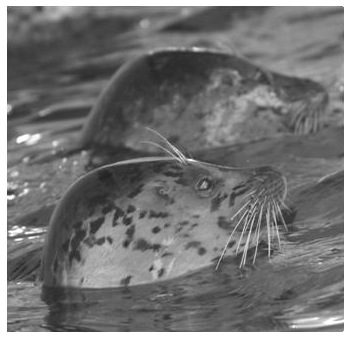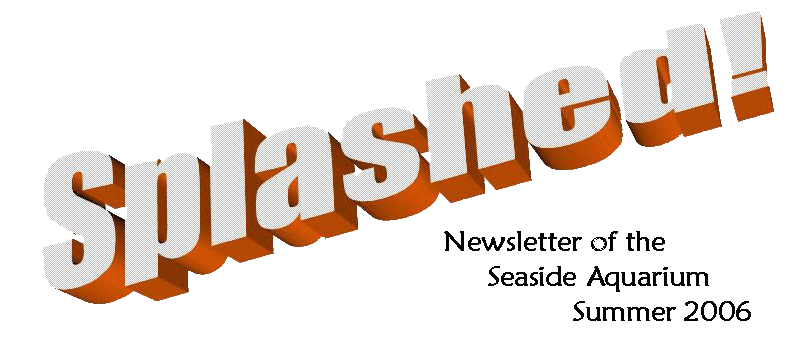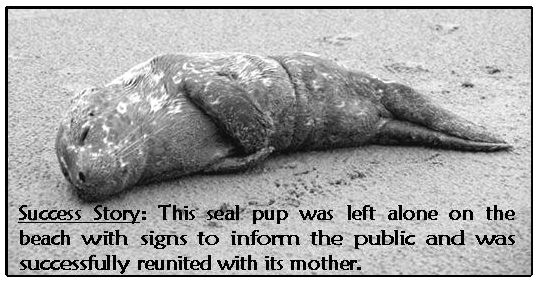

Since 1995, the Seaside Aquarium has served as the North Oregon Coast faction of the Marine Mammal Stranding Network under the instruction of Portland State University. We respond to more than fifty calls per year about seals, sea lions, whales, or dolphins that have accidentally or purposely come ashore. Our main responsibility is public awareness and safety, although we also keep records of all strandings and inspect dead mammals for cause of death. The records we keep help to observe trends in wild mammal populations.

The best policy is to leave any marine mammal you find on the beach alone.
In the summer, most of the calls we receive are about baby seals. Seals, sea lions, and other pinnipeds (marine mammals that come ashore) mate and give birth on land. Birthing season for seals runs from May through August. Just like human mothers and babies, baby seals need to sleep large amounts to support themselves and their young. Mother seals deposit their babies on the beach while they hunt for food, planning to return as
|
If you find a marine mammal on the beach that looks ill, stranded or injured, call the Seaside Aquarium at 503-738-6211. They will post signs informing the public to leave the animal alone and will monitor the situation. Do not try to approach, feed, or move the animal. They move quickly, even when injured, and can bite or transmit diseases. |
Inside:
|
soon as possible. Often, people see baby seals and think they have been abandoned. More likely, the mother is fishing nearby and will return if the baby is left alone. Sometimes well-meaning people remove babies from the beach and take them someplace they believe is safer, like the aquarium. We do not remove seals from the wild and can not rehabilitate babies. Their only chance for survival is to reconnect with their mothers.
 If you discover a baby seal on the beach,
leave it alone and call the Seaside Aquarium so we
can post signs informing the public that we are
monitoring the situation and the baby needs to
remain where it is.
Other marine mammals commonly seen on
the beach in the summer are molting Elephant Seals
who rest on land while they shed a
year's worth of fur. They grunt and
groan and are intensely cranky. Molting
seals are regularly mistaken for injured
animals. They move slowly and look like they are
dying, but can move very fast if approached
and have nasty tempers! Viewing is best done
through binoculars.
It is illegal to touch, feed, or disturb baby
seals, molting seals or any other marine mammals.
Summer provides a great opportunity to observe,
but remember: you are in their home, be respectful guests!
If you discover a baby seal on the beach,
leave it alone and call the Seaside Aquarium so we
can post signs informing the public that we are
monitoring the situation and the baby needs to
remain where it is.
Other marine mammals commonly seen on
the beach in the summer are molting Elephant Seals
who rest on land while they shed a
year's worth of fur. They grunt and
groan and are intensely cranky. Molting
seals are regularly mistaken for injured
animals. They move slowly and look like they are
dying, but can move very fast if approached
and have nasty tempers! Viewing is best done
through binoculars.
It is illegal to touch, feed, or disturb baby
seals, molting seals or any other marine mammals.
Summer provides a great opportunity to observe,
but remember: you are in their home, be respectful guests!